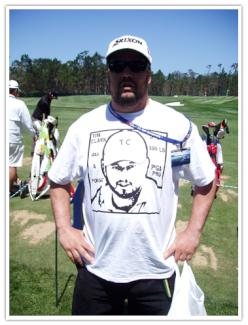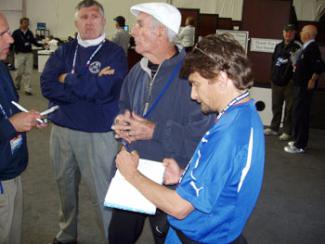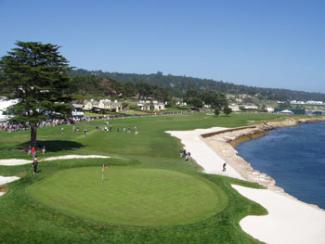Featured Golf News
The U.S. Open at Pebble Beach: A Cybergolf Diary
It was a weird day, even for Northern Cali. How weird was it? Tom Watson sang The Doors, Jack Fleck praised the Lord, and Tim Clark's posse was howling.
Yes, you read that correctly, Watson tried to sing, Fleck is still very much alive, and Tim Clark has a posse . . . Tim Clark! I guess Frank Lloyd Wright was correct: Tip the world over on its side and everything loose lands in California.
Where to start on Wednesday? Everything was bizarre, from sunrise to sunset. As first light illuminated the sea grass and ice plant of the Monterey Peninsula, angry nimbus clouds roared in the sky. It looked like hurricane weather. Everyone scrambled for their long pants, umbrellas, and jackets.
An hour later, the day turned out perfect. After a wobbly start (Apollo's horses must have slept in a bit), the sun settled in, every cloud fled and the sky shone deep-azure blue all day long. Grab your golf clubs, grab your surfboard, grab your Coppertone. So don't bother looking at the sky in the morning; you can't predict the next half-hour, let alone the day.
After getting settled in, it was time for your friendly neighborhood sportswriter to troll the practice range for interviews. That's the Tuesday-Wednesday drill, gather info in prep for the week.

Billy 'Signboy' Nathan in His Tim Clark Shirt
The Posse Leader
And guess who turned out to be the first interview? Sergio? Furyk? Zach Johnson? No . . . Billy Nathan.
No, not the Billy Nathan who sells hot dogs. This Billy Nathan is the head of the Tim Clark Posse, and he's a real-life "Signboy." He's exuberant, he's funny, he talks in his own super-cool lingo, and he's passing out T-shirts in support of his favorite player.
And they're going like hot cakes.
"I came all the way from Humboldt County to follow Tim," he cheers energetically. "There's a whole bunch of us that love Clark because he's the nicest guy in the world and he has a great game. I follow him all over, and root for him all day long."
"Absolutely," agrees Mike O'Brian, who joined the posse here at Pebble, but has been a fan of Clark for years. "Clarky is a little guy battling against the tall trees. I'm little and I don't hit the ball that far, but when he wins, it inspires all us sprouts to challenge the green giants. That's our Players champion!"
And suddenly, there's a hooting and hollering from a number of white-shirted golf fans, all cheering Tim as he hit frozen ropes to a distant flag. Clarky scrapes the divot of the club with his shoe, then looks back and beams a smile broader than he is tall, and waves. The crowd erupts with the loudest cheer of the day on the range.
What a scene! I mean really, am I in Pebble Beach or South Africa? Cue the vuvuzelas! On second thought, don't cue the vuvuzelas. They sound like a flippin' whoopee cushions.
Clarky is the kind of underdog that can win a U.S. Open. He has a phlegmatic demeanor, so he won't melt in the crucible of a major on Sunday, especially not a major where length is not an issue. He's a grinder. He splits fairways with military precision He hits laser-beam irons, a must when trying to get on these tiny Pebble Beach greens. With a Players Championship under his belt, he's learned how to close. The key for Clark will be to stroke the putter smoothly and every putt must be struck squarely on the club face on these bumpy poa annua greens. Like any other U.S. Open champion, Clark will have to be at the top of the list putting to win.

Jack Fleck Holding Court (Cybergolf's Jay Flemma is on the right)
The Giant Killer Had the Lord on His Side
Speaking of fairways and greens, NoCal and underdogs, my next interview was a stunner, a bolt from the blue. As I strode towards the media center exit, notebook in hand intent on finding a Garcia, Curtis or Paddy, an elderly gentleman in a tam o'shanter and windbreaker greeted me with a hearty hello and a handshake. Just as a matter of reflex, I looked at his badge to get his name.
"Jack Fleck" it read.
For those of you who couldn't pick Jack Fleck out of a line-up of Duke Ellington's orchestra, he's the guy who snatched the 1955 U.S. Open from Ben Hogan. Back then, they played 36 holes on Saturday. Hogan had strode off the 18th green at San Francisco's Olympic Club thinking he'd just won his record fifth U.S. Open, and everyone else thought he had won too. He even handed his ball to the head of the USGA Museum saying, "Here, this is for Golf House."
Hogan was sitting with a few journalists - his buddy Dan Jenkins included - talking about his victory when someone chirped up that one man was left out on the course who could still tie Hogan. He needed two birdies over the tough last four holes to do it.
Hogan asked who it was, and the journalist replied, "Jack Fleck."
Hogan looked thoughtfully for a second, and then said, "Well, I hope he makes three birdies or one. I don't want a playoff."
Hogan didn't get his wish or his record fifth Open title. Fleck made two birdies, including a heart-pounding closer on 18, posted a 67 for an aggregate of 287 (7-over), and then held off a late charge by Hogan to win the Sunday playoff.
And here's the great man, the oldest living major champion of golf (89 in November), who politely asked me out-of-the-blue if I had time to chat with him. I felt like Zeus had just called me up for a tour of Olympus and then said Neptune was packing it in and would I like the job?
I had Fleck all to myself for about 10 minutes before somebody saw me with a rapt look on my face, scribbling away and figured, "Flemma's talkin' to somebody over there, and by the intense gaze he's wearing, it must be somebody worth checking out!" And suddenly we had a small scrum. But that's what happens at a major. We're all there working. You have to move fast and be in the right place at the right time. Hustle and you're rewarded. Fleck appearing and talking was so important to golf, I even took a break for a minute to go over and tell two of my golf-writer buddies that "Fleck is over there discussing '55. Drop what you're doing and go now."
What stories he had to tell. Hogan was his idol growing up, but Fleck wasn't so awed by the man that he was going to lose the Open. "Hogan wouldn't have wanted me to shoot 80 would he?" he asked mischievously.
He told us how he and Hogan were the only ones playing the new Hogan irons that fateful weekend at Olympic. Fleck had placed the order only a few short weeks before and Hogan himself brought two wedges to him at the Open. They weren't even available to the public yet, and there's Fleck stunning Hogan and the golf world with them.
He told us about George Thompkins, a military man serving as a roving marshal for the last six holes, who used newfangled Army walkie-talkies to get scores so he could accurately tell Fleck what he needed to do to tie Hogan.
He even told us about how everyone that week hated Olympic Club which - like Pebble - has tiny, curvaceous greens and narrow corridors of play. "They told me to play only one practice round because if you play more, you'll get too scared to hit the ball," explained Fleck. "But I played it all week and loved it! It became my favorite course. I could hit those fairways like they were nuthin', I could play any sand shot out of any bunker, and I putted the greens like they were flat . . . and all this while Corky Oliver was losing a ball in the rough, dropping another one and then losing that one without even taking his stance over it!"
Then Fleck got serious for a minute and told us the real story of how he thinks he won the Open: A chance encounter and divine intervention.
"An elderly man came in my shop. I was all alone. [He said] 'I've got to congratulate you. You qualified for the Open. You're doing good on the tour.' " Fleck told the man that he hadn't come close to winning on the tour.
"Don't you play to win?" Fleck says the man asked him, to which he replied "No."
Then the man said, "I want you to pray for the power and the strength to compete," and left.
"Well, that hit me like a ton of bricks," Fleck admitted.
Then, not long after, Fleck said that he twice heard a voice tell him, "Jack, you're going to win the Open."
"I looked around but there was nobody there," Fleck explained. "I said to myself, 'What kind of crazy show is coming on this channel?' "
But when it happened a second time, Fleck knew it was divine inspiration. "It was the Lord, and I have to give all the credit to him," he explains proudly. "The good Lord's intervention gave me the strength to win the Open, and I'm forever grateful."
It may sound strange to us, 55 years removed, but faith does move mountains. It was no less a person than Bobby Jones who said that fate has determined who will win a golf tournament before the first ball is struck. I can't speak for any of that - metaphysics and existentialism were never my long suits, but I think we all admit that with that kind of passion and inner peace as their fulcrum, people can move the world.

Pebble Beach's Incomparable 18th
Tom & Jim Morrison
And speaking of moving the world, didn't Tom Watson do that at Pebble Beach in 1982? His chip-in on 17 is a time-capsule moment not just for golf, but for all sports. I had found an old article he wrote called, "Read My Mind as I win the U.S. Open," where he described shot-for-shot the back nine of that magical Sunday, and I used it in my preview piece, along with an old 35-page article on the '82 Open by Herbert Warren Wind which is now, sadly, out of print.
I reached out to Watson for an interview, however brief, while we were at this Open. His people were amazed at my finding those ancient golf-writing treasures and we tried to arrange something before the Open started.
Watson had also scheduled an interview with all the assembled journalists for yesterday afternoon, and as I'm sitting waiting for him to enter the interview room, I'm re-reading his article. Suddenly, there's a hand on my shoulder and a Midwest drawl asks, "Whatchya readin'?"
I showed Watson and we chatted for a few seconds about it, before Pete Kowalski and Beth Murrison of the USGA came in . . . and that's when the wackiness began.
Pete commented on how Tom had fooled everyone: they were waiting for him to enter the front of the room, and that's when Watson went into a comedy/karaoke act.
"I came in the back door . . . I'm a back door man!" he shouted at us, and we laughed. He had us in the palm of his hands from the get-go, and pressed his advantage. He asked, "How many of you guys like that song?"
A hundred journalists just blinked back at him stupidly in anticipation as to what could possibly come next . . . so Watson suddenly belted out . . . "Hey now, baaaaaaaaaaaaaaaby!!!!!!!! I'm a Back Door Maaaaaaaaaaan!"
We've seen a lot of zaniness in the interview room, but that left-field shocker makes the all-star weirdness team. The room fell apart in chunks, laughing hysterically and cheering. One of my Irish golf-writer buddies was sitting next to me asked me, "Did I just drink a whole bottle of Bushmills and not know it?"
Sixty-year-old men aren't supposed to sing "Back Door Man." It's been a law for sometime now, there are signs everywhere. "Truckin'" or "Sugar Magnolia," maybe, but not "Back Door Man." Never forget, the song has a strong sexual overtone - which surely Tom missed, but if there are two things people hate it's a dirty old man and a clean little boy. As for Watson singing any rock 'n roll, stranger things have been reported, but not by reliable sources.
And thus began the most hyperactive, but also informative, interview I've seen since Rocco Mediate. Part Lady Gaga, part Kansas City philosopher, and part golf coach, between Watson's 45 minutes in the press room, 10 minutes in a small scrum and a few short, but tight moments with me, we got masterful insights into Pebble from the champion who authored the greatest back-nine battle in recent Open history.
"At this level of the game, where so many players strike the ball and putt so well, the mental dimension is the difference, particularly at majors," he said. "I hate failure, so I taught myself how to win, and also how to win while I might not be playing my best golf. I prepare the best I can."
Then he gave us all some advice on how to play Pebble.
"At Pebble Beach you could get on a roll here . . . 1, 3, 4, 5, 6, and 7 . . . you've got five pretty good birdie chances right there. You could get the ball close to the hole. You're hitting short-irons into the greens. Then the golf course starts. But that's where one takes advantage," he explained. "It's like Jack [Nicklaus] did in the final round, birdied five holes in a row. And you can do that on this golf course. But you still have to play 8, 9, 10, 12, 14, 17, and 18. You've got your work really cut out for you."
Then Watson reminisced a bit. "It's so exciting to come back to Pebble and get a chance to play an open here one more time. I would drive my '66 cherry red, Chevy Chevelle all the time to Pebble," where the starter would just wave to he and his buddies as they played for free.
Then Watson walked away cheerfully, leaving me with the warm thoughts of a man just described himself simply as "a golfer. It's what I do and I love it. I can't think of a better place for those who love golf than right here. This place is pretty special."
Moving on to the Magic Carpet
And those were the final thoughts I reflected upon as I watched the sunset from the Jacuzzi of my hotel: happy fans, happy champions emeritus, living legends, and without a doubt the most active bunch I've seen at a U.S. Open in years.
I'll miss this Jacuzzi, those jets feel great on my rotator cuff. Sadly, I'm switching to the "Magic Carpet Inn" starting tomorrow because the [name of hotel deleted] tried to charge me 2½ times the rate for the weekend - which, for pecuniary reasons, benefits them starting on Thursday. But the Magic Carpet Inn is great too. No, Tom Watson won't be stopping by to sing the song by The Guess Who, but I get free grass for my camel, and discount oil for my genie lamp, so that's a plus.
So as the northwest corner of a brand-new crescent moon shines near the North Star in the sky, crickets and cicadas sing, and my head hits the pillow after a day stranger than fiction, but a dime-a-dozen for NorCal. But when it comes to the U.S. Open, as hometown boy Bob Weir says, "You know it's gonna get stranger, so lets get on with the show."
Since launching his first golf writing website in 2004, http://www.jayflemma.thegolfspace.com, Jay Flemma's comparative analysis of golf designs and knowledge of golf course architecture and golf travel have garnered wide industry respect. In researching his book on America's great public golf courses (and whether they're worth the money), Jay, an associate editor of Cybergolf, has played over 220 nationally ranked public golf courses in 37 different states. Jay has played about 1,649,000 yards of golf - or roughly 938 miles. His pieces on travel and architecture appear in Golf Observer (www.golfobserver.com), Cybergolf and other print magazines. When not researching golf courses for design, value and excitement, Jay is an entertainment, copyright, Internet and trademark lawyer and an Entertainment and Internet Law professor in Manhattan. His clients have been nominated for Grammy and Emmy awards, won a Sundance Film Festival Best Director award, performed on stage and screen, and designed pop art for museums and collectors. Jay lives in Forest Hills, N.Y., and is fiercely loyal to his alma maters, Deerfield Academy in Massachusetts and Trinity College in Connecticut.
Story Options
 |
Print this Story |
